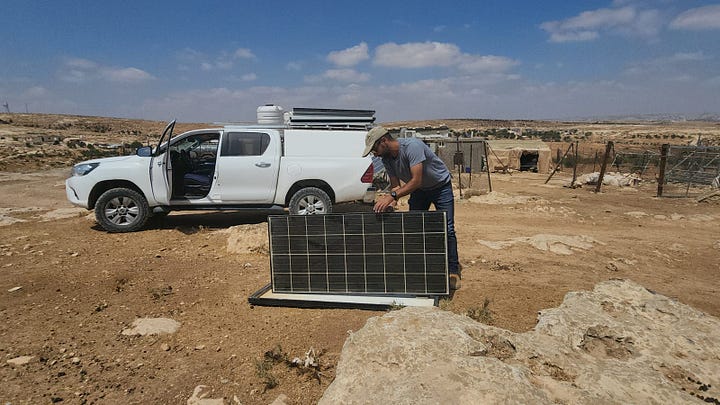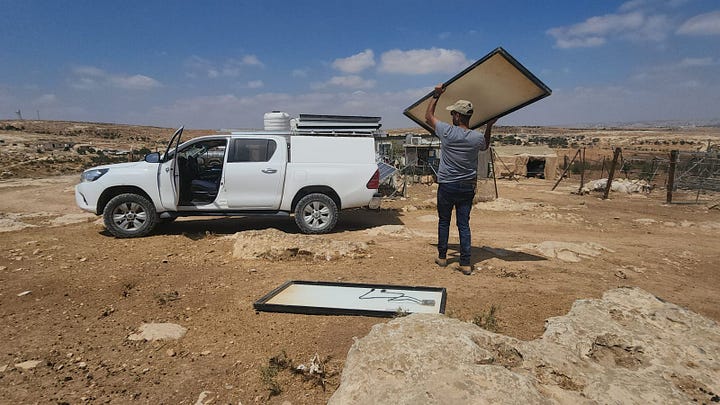



Ahmed Al-Najjar, from the village of Qawawis, shared with me that “In 2011, the Comet ME Foundation provided us with solar panels to produce electricity for the village. On August 14, 2022, while we were doing maintenance work on the solar panels, an army car arrived and soldiers demanded that we stop working immediately. They told us the Civil Administration would come and decide if we were allowed to continue working or not. Elan arrived shortly afterwards and I knew that there was no hope of continuing our work. As soon as he got out of his car, he told the soldiers to confiscate everything. Immediately, they started removing solar panels, placing them inside and on the roof of his car. We tried to talk to him, explaining that we were not doing anything new; we were only doing maintenance work on the existing solar panels. He did not listen and the soldiers continued their work. All of our solar panels were confiscated that day and since then we have been without electricity.
He continued, “One way this has affected my family is that my mother, Wadha Al-Najjar (Wadha Abu Aram), who suffers from diabetes and lingering effects of Covid-19, is unable to receive the medical care she needs without electricity.”
Wadha Abu Aram expanded on her son’s story: “In October 2022, when I fell ill with Covid-19, the doctors told me that I would need an oxygen machine since the disease had permanently affected my lungs. The oxygen machine requires electricity to function and my Diabetes medication needs refrigeration but the electricity from solar energy is not sufficient. . The electricity often stops working. On at least two occasions, I had to be taken to the hospital suffering from shortness of breath since we did not have enough electricity for the oxygen machine to work. We have also lost my medicine and our food many times because the refrigerator has stopped working. I cannot turn on a fan at night. Before solar energy, we used candles for light. Once the solar panels were installed and we had access to electricity from solar energy, we started using the refrigerator, TV, and washing machine, and we also charged our phones. We could not do many of these things before 2011 because there was no electricity at all. Confiscating the solar panels means taking us back 12 years.
' This is a new and rare event,” Tamar from Comet ME explained. “The solar panels have been in place in Qawawis since 2011 and we have completed maintenance work on them in the past without major problems. The Civil Administration is now using the excuse that we are working in an area with demolition orders on Palestinian property to confiscate the solar panels. Furthermore, Elan threatened our team that if they put new panels up, he would come within 48 hours and confiscate them. This will have wide-ranging consequences for the area. If we want to do maintenance work or repair any system for any family, Elan can come and confiscate the equipment under the pretext that it is new. All the communities in Masafer Yatta benefit from Comet Me solar panels and the electricity they produce. We also provide these communities with water pumps, tanks and filters. The water filtration and pumping system require electricity to function. Without electricity from the solar panels in the village of Qawawis, the water system has also stopped working. We are still following the Qawawis case in the courts and trying to recover the panels for the family but we do not know if we will succeed or not in this endeavor.”
She continued, “In June, after the last court decision regarding Masafer Yatta, the army detained Comet Me employees and confiscated our car while we were on our way to repair faults in Masafer Yatta. The soldiers ordered the employees to leave from that time until today. It is currently impossible for us to return to the 8 villages which we serve; impossible to access the total of over a hundred water systems and over a hundred electrical systems. Because of the ban, we cannot repair anything in Masafer Yatta and any machine failure there, even if it is small, becomes a big issue because the specialists are unable to get to the villages.”


